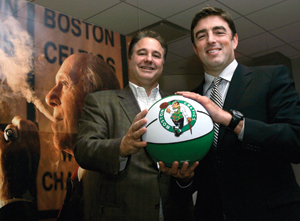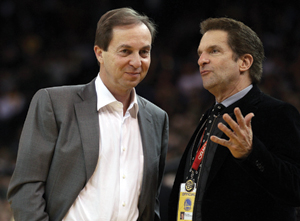Guggenheim Partners is buying the Los Angeles Dodgers. Platinum Equity and its CEO, Tom Gores, together purchased the Detroit Pistons last year. Very quickly, the once-taboo notion of funds owning teams, or part of teams, is more than gaining credence. It’s become a high-profile reality.
But is this a wave that will redefine sports team ownership, or is it just another occasional ripple in a sea of teams owned by individuals?
 |
Guggenheim Partners has agreed to buy the
L.A. Dodgers for a record $2.15 billion.
Photo by: GETTY IMAGES
|
For years, financial firms such as Platinum and Guggenheim viewed teams as losing propositions because of high labor costs and strict regulatory oversight from the leagues, echoing the reason stock ownership of teams never worked. Funds also shied from sports teams because they did not return enough profit (if any at all), and leagues wanted long-term commitments from new owners, not the short, buy-and-sell investment strategy favored by private equity funds.
Market forces of recent years have played a role in changing some of the dynamics.
“Over the past few years, we have sat down at the table more than two dozen times [with organized capital funds],” said Citigroup managing director Brad Rangell, referring to funds that pool money to buy companies. Citi advised then-Pistons owner Palace Sports & Entertainment on the sale to Gores. “Four or five years ago,” Rangell said, “those conversations were few and far between.”
Media, Stadium Biz Drive Interest
The change began in 2008, with the global financial crisis battering some values enough, as was the case in Detroit, that the cost of purchase was low enough to attract the funds’ attention. And as sports team ownership became multidimensional through ancillary businesses like stadiums, media channels and concessions, sustaining losses on a team suddenly no longer had to be a deal breaker.
The Dodgers’ runaway price (in excess of $2 billion) is predicated on the value of starting a regional sports channel, or at the very least using that as leverage to squeeze out a record-setting media rights fee from a cable operator. The price is hardly based on the economic blocking and tackling basics of team ownership: selling tickets, sponsorships and concessions.
 |
Bain Capital managing director Steve Pagliuca (left), with Wyc Grousbeck, is part of the group that bought the Boston Celtics in 2002.
Photo by: AP IMAGES
|
Another factor propelling the trend is that several individuals with backgrounds in private equity have become key stakeholders in franchises. Among them are Joe Lacob with the Golden State Warriors and Steve Pagliuca with the Boston Celtics. They’ve made sports team ownership more a topic of conversation in their non-sports business worlds, said Bob Caporale, chairman of sports advisory firm Game Plan, which itself is considering establishing a fund to buy sports teams and other assets.
“There is an increasing interest to learn more about the sports industry, to see whether a fund might find an opportunity [with a team] to meet their criteria,” he said.
If a private equity fund saw team ownership as the only way to get at the ancillary businesses — whether media, stadium, technology or ticketing — then the deal might proceed, Caporale said.
Investment in those other sports businesses is far more common and accepted in private equity, though still not entirely commonplace. Providence Equity, for example, owns part of the YES Network and Soccer United Marketing. A fund led by Dave Checketts invested in Legends Hospitality, the concessionaire joint venture between the New York Yankees and Dallas Cowboys. Checketts is also chairman and CEO of Legends.
Many Skeptics
 |
Having private-equity investors such as Joe Lacob (left), with fellow Golden State Warriors co-owner Peter Guber, commit to owning sports franchises has helped push the topic of conversation in the finance world.
Photo by: GETTY IMAGES
|
Don’t be fooled, however, that the tide’s turned and private equity now embraces owning teams.
“It is a tiny part of the [team] mergers and acquisitions market,” said Andrew Kline, founder and managing director of sports advisory firm Park Lane.
Indeed. Take David Moross, who may know more about the subject than any person alive. He started a fund with IMG in the late 1990s to invest in and buy sports assets, including teams. After years of focusing on sports, he changed the fund’s focus (with IMG out) to leisure and media. His Falconhead Capital owns a running events company, Competitor Group, and a spa business, among others.
Teams, he said assuredly, are bad investments.
“We have studied 72 teams and we haven’t bought one,” Moross said. “I don’t think it is appropriate for any professional investor. Look at the balance sheet and the income statements of every team, and you will come to one conclusion fairly consistently: They are not a high-margin business, and they are highly regulated by the leagues.”
Asked about these concerns, Rangell of Citi countered that it behooves the funds to have successful teams to drive the ancillary businesses, which is where the real money is. But Moross notes that those opportunities described by Rangell are scarce. “Regional sports channels yes,” Moross said, “but there are few cases where that works.”
Leagues More Comfortable
Whether there is money to be made in team ownership or not, what is clear — as evidenced by the Platinum Equity and now Guggenheim purchases — is that leagues are getting more comfortable with these companies.
“We have been very encouraged by the leagues’ willingness to deploy a very reasonable approach when faced with a transaction involving organized capital,” Rangell said.
Park Lane’s Kline agreed.
“You are seeing both private equity and the leagues more open to it,” he said.
| Turnkey Sports Poll |
| The following are results of the Turnkey Sports Poll taken in March. The survey covered more than 1,100 senior-level sports industry executives spanning professional and college sports. |
|
|
| In which of the following leagues would buying a franchise yield the greatest return, assuming it were sold in 10 years? |
| NFL |
63% |
| MLS |
16% |
| MLB |
8% |
| NBA |
7% |
| NHL |
5% |
| Not sure / No response |
1% |
| In your opinion, do the majority of franchise owners in each of the following leagues make a profit, break even or lose money in any given year? |
| |
Make a profit |
Break even |
Lose money |
Not sure |
| MLB |
46% |
36% |
17% |
1% |
| MLS |
10% |
22% |
65% |
3% |
| NBA |
19% |
25% |
56% |
0% |
| NFL |
98% |
1% |
0% |
1% |
| NHL |
14% |
36% |
49% |
1% |
| Source: Turnkey Sports & Entertainment in conjunction with SportsBusiness Journal. Turnkey Intelligence specializes in research, measurement and lead generation for brands and properties. Visit www.turnkeyse.com. |
Leagues, however, may not have much choice, as the pool of individuals who are able to buy teams shrinks as prices go up. Commenting on the Dodgers’ $2 billion price, New York Giants co-owner Steve Tisch said, “That kind of money is not going to come from some deep-pocketed individual, necessarily.”
Asked whether the NFL might change its policies barring corporate ownership, Tisch replied that he didn’t want to make any predictions.
NFL teams earn healthy returns, so it’s possible America’s top league can attract individuals willing to spend billions of dollars. But there are plenty of teams in the NHL, NBA and MLB that lose significant sums of cash, and those leagues have long allowed corporate ownership. In fact, as some losses grew substantially in recent years, from millions of dollars annually to tens of millions, individuals looking at buying teams became less willing to step in, according to Michael Yormark, president of the Florida Panthers’ parent company, Sunrise Sports & Entertainment, while speaking on a private equity panel last month hosted by the Association for Corporate Growth.
“The big turning point was, Where does capital come from [to fund these sizable losses],” Yormark said of the trend toward potential ownership now including funds. “There are not a lot of people out there who can buy these properties and fund them.”
Yormark declined to comment on follow-up questions about whether Sunrise is seeking private equity investment. The company is in the market looking for investors, sources said, as it seeks to develop land around the Panthers’ BankAtlantic Center arena.
To accommodate private equity, leagues are forced to bend their rules on ownership to at least some degree. When individuals buy teams, leagues require significant financial disclosure — but funds have multiple partners who are reluctant to each offer the kind of financial disclosure the leagues prefer. That is where the leagues have proved willing to hash out compromises, Rangell said.
For Falconhead’s Moross, however, that just speaks to the problems with funds owning teams. A team owner, he said, must be passionate about his or her club and be part of the community. Funds, he said, are not passionate about anything but bringing forth higher returns.
“Teams may sound great … but they have challenges,” Moross said. “These are very dangerous investments.”






